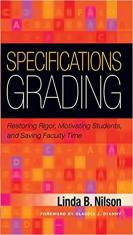And What Should They Remember?
Our students are exhausted. (So are we). We’re limping toward the finish line. But if we want our students to remember what they’ve learned with us, they need to feel something more than just relief when the school year comes to a close (Cavanagh, 2016).
It’s easy to let a semester end with a whimper, or with an exam review; but you can help your students consolidate their learning, and enhance the chances that they’ll be able to transfer their new knowledge and skills, if you wrap up your course by giving students an occasion to reflect on what they’ve learned, and how they’ll use it in the future. They need to see how they’ve grown and transformed. When we pause and allow them to take pride in that development, and appreciate the community they’ve formed in our classrooms, we’re helping them to make meaning of their experiences. The last days of class can serve the same emotional function as a commencement ceremony, writ small.
There are easy things you can do, even without advance planning, to create some closure for your course. You might give students a few minutes to think back to the beginning of the term, and write down the three most important things they’ve learned, and how they’ll use them in the future. You could ask what they’ve learned that most surprised them; what they want to research or learn more about; how their views changed; how they’d explain the course to a relative or a future employer; or dozens of other questions. Students should discuss their responses with classmates, and learn what others found most valuable or memorable. This can move from a small-group discussion to a class-wide discussion. Some faculty add an element of humor with a competition to distill the course into the best tweet or clickbait headline, or by asking students to generate a top-ten list of course concepts. Students might also reflect on what they themselves contributed to the class, or whose contributions they feel most grateful for. They might collaborate to draw a concept map of the course on the board. With a bit of time to plan, you might develop a game, like Jeopardy or Quiz Bowl, drawing on the course material.
Students will appreciate hearing from you, too. What did you learn, teaching this course? What has it meant to you? We don’t always take time to congratulate our students on their learning, or the challenges they’ve tackled on the way. If you let them know you’re proud of them, and that they should be proud of themselves, you’re helping them to value the learning they’ve done in your course. Let’s leave them feeling accomplished and curious, eager to learn more.
Summer Reading/Working Groups
Specifications Grading
 Linda Nilson argues that “our current grading system is broken. It doesn’t work well for faculty, students, post-secondary institutions, or prospective employers of our graduates.” In Specifications Grading, she offers “an alternative system that restores rigor, motivates students, and saves you grading time.” We’ll use her text as the foundation for a broader discussion about grading, and how to improve our practices, so that our courses, exams, and assignments are measuring what we want to be measuring.
Linda Nilson argues that “our current grading system is broken. It doesn’t work well for faculty, students, post-secondary institutions, or prospective employers of our graduates.” In Specifications Grading, she offers “an alternative system that restores rigor, motivates students, and saves you grading time.” We’ll use her text as the foundation for a broader discussion about grading, and how to improve our practices, so that our courses, exams, and assignments are measuring what we want to be measuring.
Tuesdays, 6/12 and 6/19, 10:00-12:00
In the Name of Identity
 It can be difficult to reach students when their assumptions and even their core beliefs are challenged by our material. Maalouf’s book will provide a starting place for discussion of how group identity plays a role in learning, and how we may be able to defuse the threats to identity that can inhibit learning, in order to create a better climate for the intellectual risk and growth we want to cultivate.
It can be difficult to reach students when their assumptions and even their core beliefs are challenged by our material. Maalouf’s book will provide a starting place for discussion of how group identity plays a role in learning, and how we may be able to defuse the threats to identity that can inhibit learning, in order to create a better climate for the intellectual risk and growth we want to cultivate.
Wednesdays, 6/20 and 6/27, 2:00-4:00



